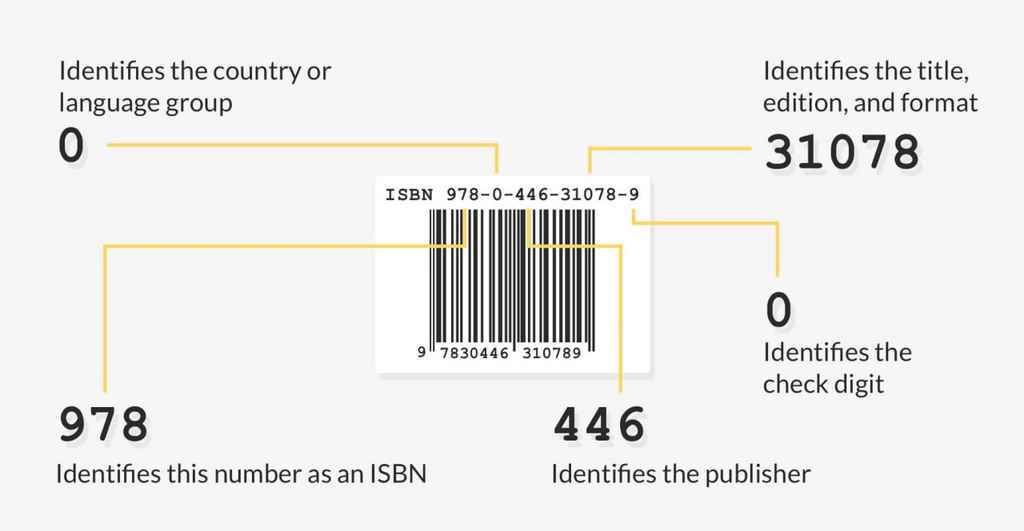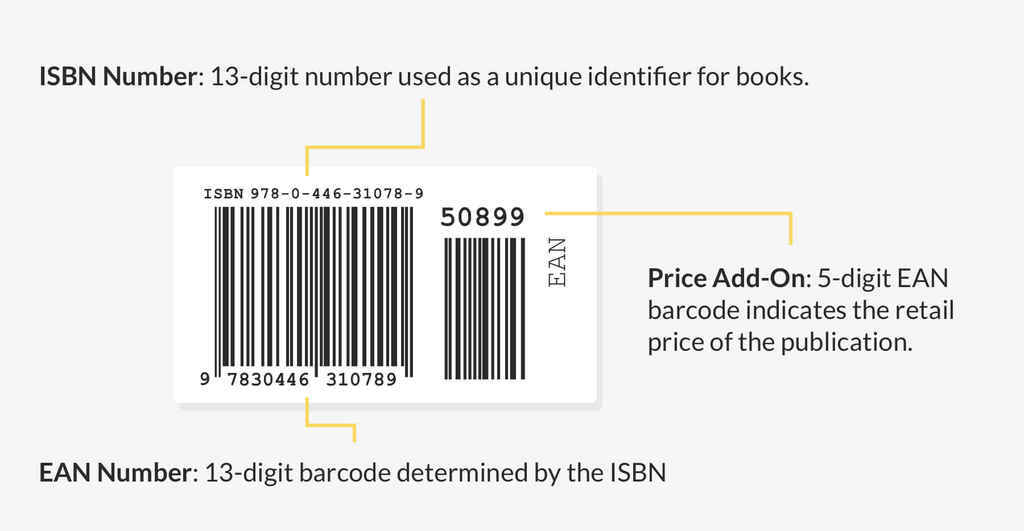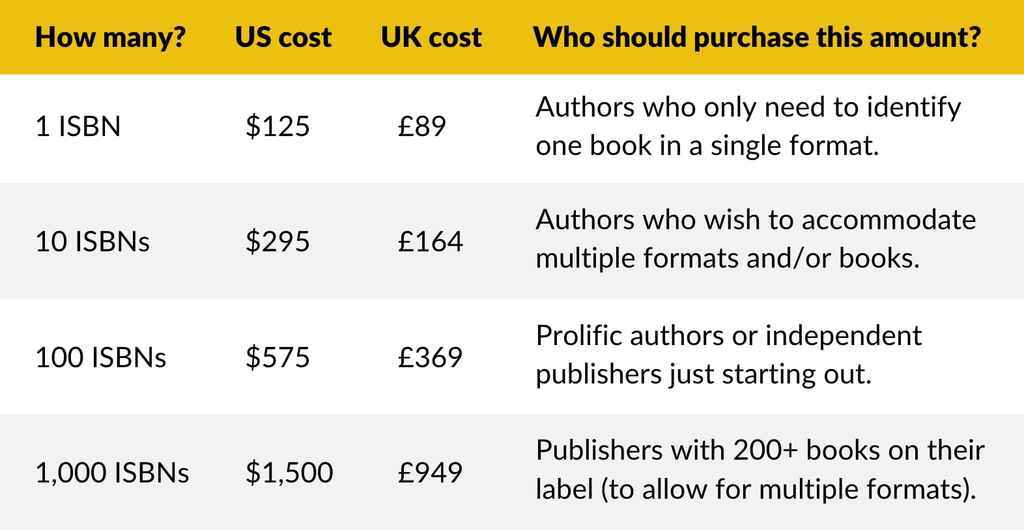What Is the Isbn Number on Books Used for
If you've done any research into publishing and distributing your own book, you'll probably have seen the term "ISBN number" floating around. But what are those 13 little numbers actually for? Read on to find out what an ISBN is, whether you really need one, and what buying an ISBN will cost you.
✅
Are you ready to self-publish your book?
Find out here! Takes one minute.
What is an ISBN number?
An International Standard Book Number, or ISBN, is a 13-digit code used as a unique identifier for a book. An ISBN is assigned to each edition of a book, enabling publishers, bookstores, libraries, and readers to find individual titles. Those who sell or lend books use ISBNs for their stock and sales records, and readers can use them to look up books online.
ISBNs are fixed and non-transferable, which means that if you publish both a print and ebook version of the same book, you will need separate numbers for each format. If you then decide to publish that ebook in a different language, you'll need a new ISBN for that version as well — and so on and so forth.
Did you know? ISBNs used to be 10 digits long, until January 2007 when they changed to 13. However, an ISBN number never expires, and even old numbers with only 10 digits can be converted into a 13-digit code with this conversion tool from Bowker.
One more quick note on ISBNs: they suffer from "ATM machine" syndrome, by which we mean they're known as both "ISBNs" and "ISBN numbers", even though the second phrase technically repeats "number". We're not too fussy about it and we'll be using both — but if you hate tautologies, feel free to stick to "ISBN".
How to read an ISBN
All standard ISBNs consist of five parts, appearing in the following order:
- The numbers 978 or 979, indicating that this product is a book;
- A single digit to indicate the country or language group of the publication (all English-language books are 0 or 1);
- A three-digit code for the publisher;
- A five-digit code for the title, edition, and format of the book; and
- The final "check" digit indicates that the ISBN has been verified.

Is an ISBN the same as a barcode?
Not quite. Though they're both numbers on the back of a book cover, a barcode is separate and provides purely sales-related information: the price of a book and the currency in which it's sold. Unlike an ISBN, a barcode can change from store to store based on the cost of the book. It's the pattern that appears on the label, while the ISBN appears numerically at the top, and is clearly labeled 'ISBN'.
You will also often see other numbers around the barcode, such as an IAN or EAN (International or European Article Number). These numbers are determined in part by the ISBN, but also provide retailer-specific information about the price of the book — in short, all you need to worry about is the ISBN and the rest will take care of itself.

Now we've covered what an ISBN is, let's tackle the next big question — do you need one?
Do you need an ISBN?
We'll start with the headline: if you're self-publishing an ebook, an ISBN isn't essential. You can indeed upload and publish your ebook to individual platforms (Amazon, Apple Books, Kobo, etc.) all by yourself, with no need for an ISBN. Having said that, it's also more professional to get an all-encompassing ISBN than to have different serial numbers on different retail sites, even if it's not compulsory.
ISBNs are more important for authors printing and distributing books in physical form (or producing audiobooks). This is because ISBN numbers are used by bookstores, libraries, and everyone in the book supply chain to identify and organize their stock. If your print book has no ISBN, it can't be sold — simple as that.
Still not certain whether to take the plunge and buy an ISBN? Let's get deeper into the pros and cons.
Reasons to wait on an ISBN
As we said, authors who only plan to publish and sell ebooks don't need ISBNs, and there are a few reasons you might want to hold fire on buying one. Here are the most important considerations:
- ISBNs aren't usually cheap (more on that later). If you're already on a tight budget, by all means, save yourself $125.
- They don't make ebooks any easier to find. If you're using an online retailer, your goal is to be as visible as possible to potential readers, and you'd be hard-pressed to find a reader who searches using numerical trade codes.
- The largest ebook retailers don't require one. The most popular online publishing platforms are Amazon, Apple, Barnes & Noble, and Kobo — all of which assign you their own identifier when you upload your book.
- Some vendors actually impose restrictions when you "bring your own number." For example, KDP Print prohibits books that already have an ISBN from accessing some of their expanded distribution channels.
- The current system is outdated. An ISBN is a great tool for tracking book sales. But the rise of self-publishing and ebook retailers' own inventory systems have made these numbers fairly inaccurate for data collection.
As you can see, there are plenty of reasons why you might want to skip getting an ISBN. But there are some authors who will still benefit from this 13-digit number.
Who should get an ISBN?
Here is a definitive list of people who will need to buy an ISBN:
If you plan to publish multiple novels and brand yourself as a legitimate publisher, buying your own ISBNs is a good idea for administrative and professional purposes — when you've paid for your own number(s), you get to choose what name appears as the publisher.
Authors interested in brick-and-mortar distribution 🧱
Not to sound like a broken record, but an ISBN is a must if you plan to print and distribute your book to physical stores. Without an ISBN, you close yourself off from this avenue and its valuable potential for sales.
Authors who want to sell their books to libraries 📚
This one gets its own section because, while libraries might not be the first distribution channel you think of, they can seriously boost your book. Not to mention that US libraries spend over $3 billion annually on reading materials, so don't discount them! Just remember that in order to get in on this action, your book requires an ISBN.
Free course: How to Get Your Book into Libraries
Tap into a world of new readers by getting your book into national libraries. Get started now.
Ultimately, only you can make the final call. If you simply want to publish your ebook on one or two platforms and see where it takes you, you can probably skip all the ISBN hassle. But if you want to print your book and control its identifiers, an ISBN could be a good investment.
If you're sold on the idea of buying an ISBN, in the next section you'll find a breakdown of how much it will set you back. You should also check out the next post in our guide: how to get an ISBN as a self-published author in 3 simple steps.
Remember that obtaining an ISBN number does not mean that your copyright is automatically registered. Learn more about copyright here.
How much does an ISBN cost?
An ISBN number costs $125 through Bowker. You can also bundle your ISBN purchases and get 10 ISBNs for $295, 100 ISBNs for $575, or 1,000 ISBNs for $1,500. Needless to say, unless you're a publisher, you'll only need to buy 1-10 ISBNs at a time.
We've broken down these Bowker costs for US authors and publishers, as well as the Nielsen costs for those in the UK, in the table below:

An ISBN won't be the most expensive item on your self-publishing shopping list, but it's not an insignificant cost either. If ISBNs are non-negotiable for you as an author, your best option is to buy a package of 10 for $295 (which works out to just under $30/ISBN). That way you can distribute your ebook and print book with separate ISBNs, as needed, and still have a few numbers left over for the next time you publish.
On a tight budget but still want an ISBN? Learn about discounted and free options for ISBNs (and their drawbacks) in the next post in our guide.
So you want to buy an ISBN, but how do you go about doing that? Check out the next post in this guide for a step-by-step breakdown!
What Is the Isbn Number on Books Used for
Source: https://blog.reedsy.com/guide/isbn-number/

0 Response to "What Is the Isbn Number on Books Used for"
Post a Comment